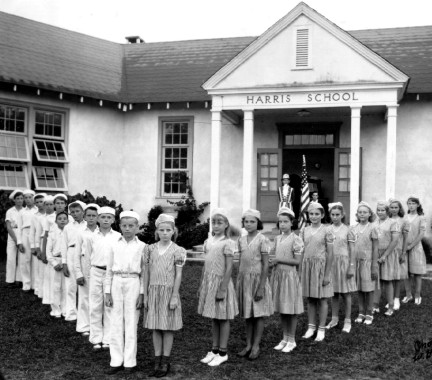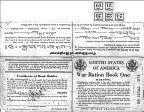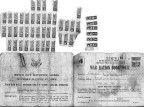
|
|
|
Sunday, December 7, 1941 . . . I remember it well. I was ten years old and was allowed outside for the first time in three weeks. My younger sister, age seven, had scarlet fever and the family was quarantined. The health officer had been to our house and tacked a large yellow sign on the front door announcing that the house and its occupants were "QUARANTINED." My dad was the only one allowed to go outside the house and that was for work only. I remember my cousin coming to the road in front of the house and yelling to see how we all were . . . she was not allowed to come in and no one in the neighborhood had a telephone.
With three children kept inside, the entire family had looked forward to that Sunday, when we could go out in the yard. And we were out there, celebrating our "freedom," when an uncle and aunt arrived. With a very solemn face he asked my dad what he thought of the news. With only one radio in our home, and it not having been turned on all day, we had heard no news.
That was the way we learned of the bombing of Pearl Harbor. Immediately the "grown-ups" ("adults," to you non-southerners), went into the house and turned the radio on. The women started crying. The men started talking in hushed tones.
A favorite uncle had recently been released after four years in the U. S. Marine Corps and knew he had to "re-up," or be drafted. All other draft age relatives immediately started flooding the Draft Boards and on Monday morning our family was well represented with volunteers. The young ex-Marine (age 22) reenlisted, and was later killed in the South Pacific.
As children, we had no idea how lives would change over the next few years.

|
|
|
In school there were daily prayers for the men in the service who were fighting for our safety. Yes, we prayed in school in those days . . . daily. We also prayed for the leaders of our country.
Patriotism was accepted as a matter of fact . . . we were PROUD to be Americans and everyone felt it was his or her responsibility to do what they could for the war effort.
There were air-raid drills both in school and out. Children were taught the sounds to listen for, and the actions that were to follow.
Adults who were not in the service felt it was their duty to take First Aid courses, taught by the Red Cross, to be prepared in case of an emergency on the home front. The course in our neighborhood was taught at a Methodist Church more than two miles from where we lived. My mom felt it was not only necessary, but urgent, that she take and complete the course. Twice a week, at night, the four of us (my mom, two sisters, and myself) would walk the two miles to the church for her to take the course. My sisters and I would sit in the back and entertain ourselves (very quietly so as not to disturb anyone) and then the four of us would walk home afterwards. We watched intently as the ladies learned to give artificial respiration and make and apply bandages.
St. Petersburg, Florida, was a small city at that time of approximately 60,000 people and many luxury hotels. The government immediately took possession of all hotels. On Saturday afternoon when we went to town (a bus ride cost five cents), instead of seeing chauffeured driven limousines as we had in the past, we would see soldiers, sailors, and marines, and military vehicles parked around the hotels.
The servicemen were nice to all the local children, talking to us, and quite often giving us chewing gum - which was becoming harder and harder to acquire as rationing began to talk its hold.
For news of what was going on in the country we relied on President Roosevelt, Lowell Thomas, and Ernie Pyle. It never occurred to us that the President would lie . . . we believed everything he told us. We eagerly awaited his "fireside chats." If we needed to sacrifice and do without in order to help in the war effort, we gladly complied with each request.
 
|
|
|
Ration books and coins were issued to all residents and were necessary for the purchase of butter, meat, sugar, and gasoline. Since my dad worked at night and there was no public transportation, he would mix his gas with kerosene to have enough to go back and forth to work six nights a week.
A garden was a necessity. We also had goats for milk, chickens for eggs and rabbits for additional meat.
Everything that could be used in the "war effort" was collected by the school children. We took great pride in collecting newspapers, rubber bands, and the wrapping from chewing gum.
Every Friday we had "Savings Stamp Day" at school, and each child would save his or her money all week in order to have ten cents to buy a savings stamp and to place it in the folder. When filled, the folder and a nickel represented $18.75 which was the price for a $25.00 war bond.
Air Raid Drills - even today I can hear the piercing sound of the alarm. When one sounded a complete "black out" was in effect immediately and air raid wardens would walk the neighborhoods to be sure there were no lights on. Quite often, in the dark, the warden would stop by our house and check on our safety since he knew my dad was working and there was a woman and three small girls home alone.
The top half of all street lights were painted black.
Vacations, as well as other luxuries, were nonexistent.
Young girls started wearing hose to church by the time they were in junior high school. And, of course, all nylon was being used for parachutes (or so we were told). You couldn't buy them so we would buy cotton hose and bleach them so they wouldn't be so dark and ugly. The result was stripped legs because they never bleached evenly.
A Colonel Householder was in charge of the armed forces in St. Petersburg during the war. We would often write letters to him, thanking him for keeping us safe, and he (or his staff) would always reply.
All school programs had a patriotic theme . . . it seems that every program I was in for years, my outfit was either red or blue. The boys always wore white.
We never felt we were sacrificing anything . . . the country was at war, and we were reared to love our country. The feeling was so completely different from what is in this country today . . . we were actually GLAD to do something that we thought was helping like walking to save gas for the service vehicles; doing without candy and gum so the service men could have it; and wearing our cotton stockings so they could make parachutes with the nylon.
And I remember the day the war ended. I was visiting a friend and since her dad was a Constable he had a squad car. It seemed only appropriate that we would all pile into the car, go to town, and ride down Central Avenue (the main street) blowing the horn, yelling, and waving.
Not only were we changed forever, but so was St. Petersburg, Florida, and the country.
|
Visitors since
June 6, 2000 |